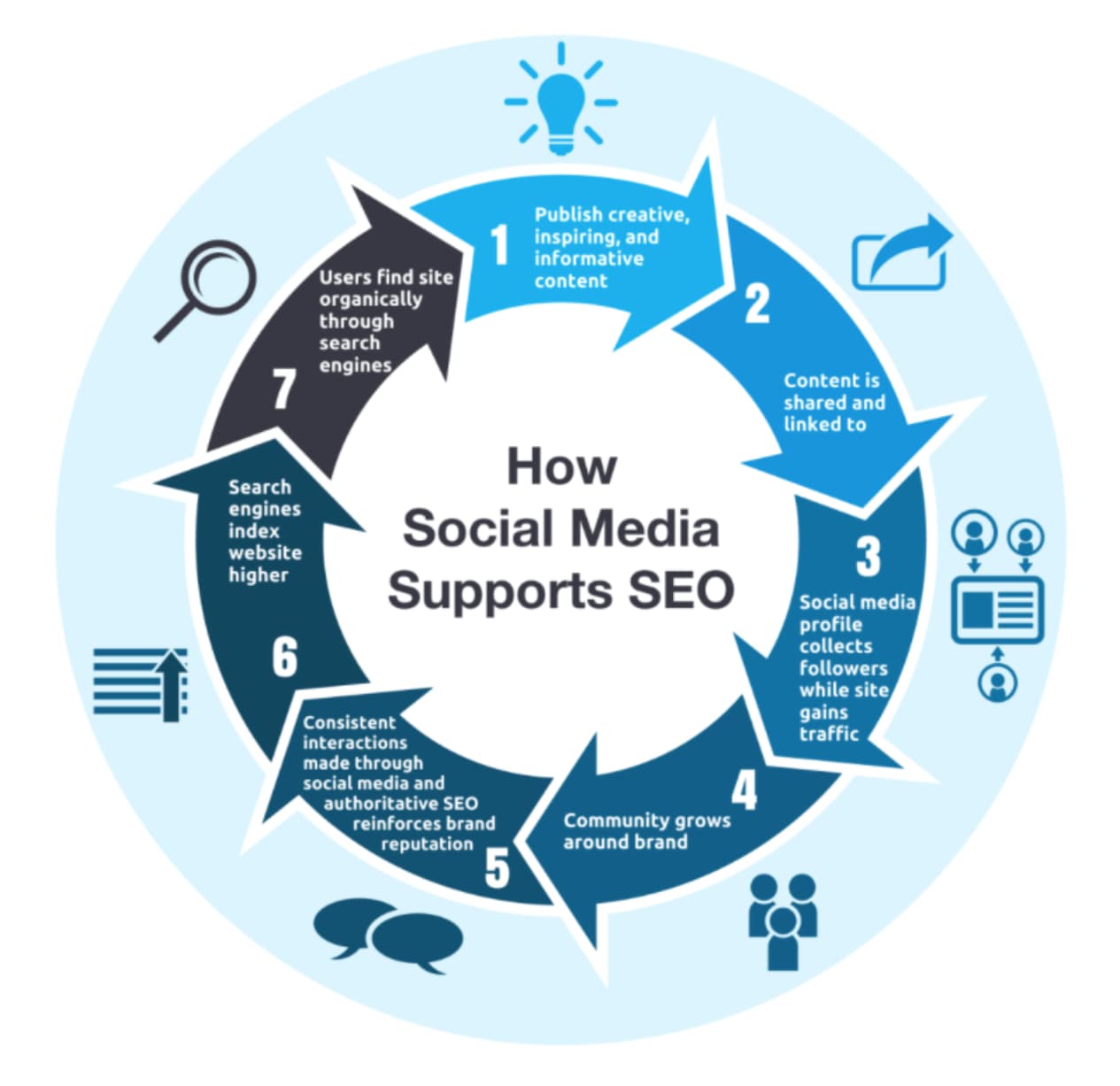Search engine optimization (SEO) is essential for social media to enhance online presence and reach target audiences. Applying SEO techniques helps your content show up more on search engine results pages (SERPs), which makes it easier to find.

SEO is vital because it can boost the visibility of your content. It can reach the perfect audience exactly when they need it. In an era where online platforms compete for recognition, mastering search engine optimization (SEO) is essential.
Implementing SEO strategies on social media drives targeted traffic to your brand’s profiles. You can use target keywords and phrases that align with your audience’s interests. SEO offers a competitive advantage by optimizing content, outranking competitors, and acquiring a more expansive market share.
Integrating SEO into your social media strategy can help establish credibility and authority. It can help solidify your brand as a reliable and trustworthy source within the industry. Enhancing your social media strategies using SEO has long-lasting effects and provides sustainability.
Unlike paid advertising, SEO strategies drive organic traffic and engagement over time. According to Lakeland SEO, consistently optimizing social media content builds a solid foundation for brand growth and success.

Here’s how to integrate SEO into your social media strategy:
Keyword Research
Conducting thorough keyword research is crucial for optimizing your online presence. Searching for keywords and phrases that resonate with your target audience is vital. You can align them with your brand or niche to boost your visibility. Utilize appropriate tools to discover valuable keywords suitable for your brand.
Check out these tips:
- Knowing what the user wants when doing keyword research is essential. Think about what your audience is searching for and why they’re searching for it. You can make content that directly meets their needs and drives traffic by matching keywords to their searches.
- Use keyword research tools like Google Keyword Planner, SEMrush, or Moz to find relevant, high-performing keywords. These tools provide valuable information to help you make decisions based on data.
- Learn about long-tail keywords. These are phrases that are longer and more specific. You can use them to reach niche audiences. You can also increase conversion rates because these keywords attract users who know what they want.
- Examining your competitors’ keywords can provide valuable insights and inspiration for your strategy. Determine your competitors and identify keywords in their content and advertisements. Doing so can help you find gaps, discover untapped keyword opportunities, and fine-tune your keyword selection.
- Regularly monitor keyword trends, industry changes, and user behavior to refine your strategy. Keep up with emerging trends, changing consumer preferences, and seasonal keywords.
To create a successful and sustainable digital presence, balance SEO optimization with user experience. Conducting adequate keyword research and using appropriate tools can help uncover valuable keywords.
Optimize Your Profiles
Optimizing social media profiles is vital for an effective SEO strategy. Infuse relevant keywords into your bio, username, and descriptions. This way, you can enhance visibility and amplify your presence in search engine results.
Consider these practical suggestions:
- Bio optimization is crucial for social media profiles, providing a concise overview of your brand or business. Use relevant keywords to describe products or services.
- Using a unique username and social media handle can improve visibility in search results. Choose a username that reflects your brand.
- Optimize social media profile descriptions to provide context about your brand and incorporate relevant keywords. Write a compelling, concise description that reflects your brand’s identity, values, and offerings.
- Maintain consistent brand messaging and keyword usage across social media platforms to establish a robust online presence and reinforce your brand’s identity.
- Regularly monitor social media profiles’ performance to improve SEO strategy. Analyze keyword trends, industry changes, and target audience interests. Adapt keywords based on these insights to ensure relevance and alignment with search engine algorithms.
Remember to balance keyword optimization and providing your audience with valuable, engaging content.
Create Engaging Content
Create high-quality, engaging content. Focus on providing valuable information and mixing keywords in the most organic and authentic manner possible. You can also infuse brand-related keywords naturally in your social media posts, captions, and hashtags. Use variations of your targeted keywords to boost your ranking in search results.

Image Optimization
Optimize your images for search engines by using descriptive file names and alt tags. Use relevant keywords that accurately describe the image content. Providing context to your images can help search engines understand their meaning. It can also enhance their discoverability.
Consistency And Engagement
Consistently post high-quality content and engage with your audience. Search engines value active and relevant social media profiles. Regularly posting and interacting with your followers can improve your SEO ranking. Encourage user-generated content and promptly respond to comments and messages to foster engagement and build a solid online community.
Conclusion
Remember, integrating SEO into your social media strategy is a continuous process. Stay updated with the latest SEO trends and algorithm changes. Monitor and analyze your social media performance to refine your approach.
By optimizing your social media content for search engines, you can attract more visibility, increase awareness, and drive organic traffic to your brand.






